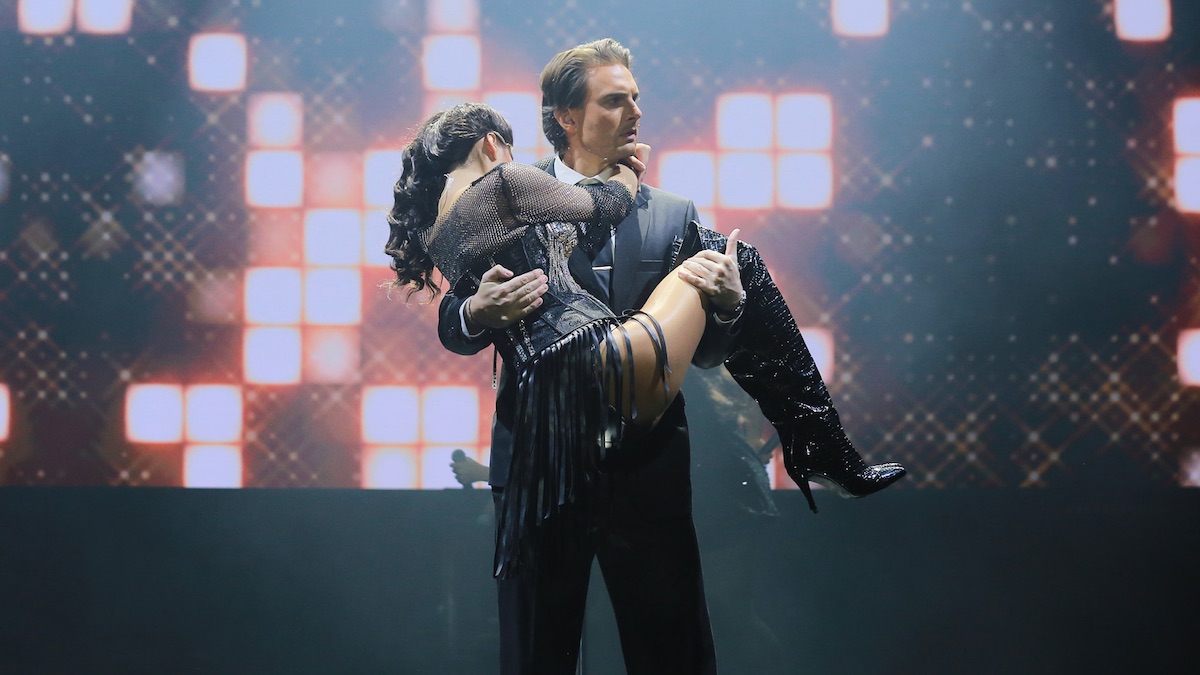There is a unique challenge that faces any jukebox musical based on a film with a legacy as towering as The Bodyguard. The central conflict was never between the superstar Rachel Marron and her stalker, but rather between the original source material and the stage production. Lawrence Kasdan’s screenplay was, even in 1992, criticized as a serviceable, if somewhat flimsy, vehicle for the astronomical star power of Whitney Houston and the quiet allure of Kevin Costner. The music was the indisputable centerpiece of the film, and it remains to be the star of the stage adaptation. If it’s possible for a sword to have more than two edges (which it is), this would be an apt metaphor since the songs, and their original siren, cast so many long shadows that overwhelm even the best of intentions.

The question, therefore, for 9 Works Theatrical, its Director Robbie Guevara, and the audience at the Proscenium Theater is two-fold: can a theatrical production of this magnitude rise above the narrative limitations inherent in Alexander Dinelaris’s book, and more importantly, can it weave a story compelling enough to justify those magnificent, world-famous power ballads? The short answer? The failure to invest in the script doomed the show to the fate as an over-produced concert; an over-reliance on spectacle revealed a hollowness that even the most soaring vocal performance cannot fully fill. We came to celebrate the music, but in some twisted sense of schadenfreude, we stayed to witness the vain struggle of transforming pop iconography into genuine dramatic theatre.
The Story
The plot follows superstar Rachel Marron (Christine Allado), who is unknowingly threatened by a stalker. Former Secret Service agent Frank Farmer (Matt Blaker) is hired as her bodyguard. Their relationship is initially defined by Frank’s rigid security demands and Rachel’s resentment, complicated by Rachel’s vulnerable sister, Nicki Marron (Sheena Palad), who develops unrequited feelings for Frank. After a near-attack at a nightclub, the professional friction gives way to a forbidden romance. The stakes escalate when Frank takes the family to a remote cabin. Here, Nicki confesses her unwitting role in corresponding with the stalker, only to be fatally murdered by the real killer—a closer, unmasked threat. The dramatic climax is set at the Academy Awards, where Rachel is scheduled to perform. Frank must race against time to unmask the killer and prevent the final, fatal attack, leading to a tense showdown and an emotional farewell that underscores the depth of their connection.
The Spectacle vs. The Slog
The struggle to translate the 1992 film The Bodyguard into a compelling stage musical is palpable in this production. While the film’s iconic soundtrack promises a thrilling night, the theatrical adaptation often finds itself at war with its own shallow, underwritten book. The result is a dramatic experience that, by many accounts, slumbers and lumbers along from song to song, featuring central characters who are often difficult to like or invest in. To offer a balanced critique, one must look beyond the plot’s weaknesses and determine whether the sheer, visceral force of Whitney Houston’s power ballads and the surrounding spectacle are enough to sustain an audience through a story that acts more as a weak vehicle than a robust narrative.
The production also struggles to maintain theatrical momentum due to distractingly clunky staging and a flat design. The frequent use of sliding walls, projections, and cinematic scrims—while attempting to be sleek—often results in slow, miss-timed transitions and missed technical cues that repeatedly disrupt the flow of the drama. Instead of creating a seamless thriller, the stagecraft often feels like a series of stiff, disjointed scenes connected by the musical numbers. This design choice, though aiming for a cinematic scale, ultimately leaves the world of the show feeling more like a basic, rotating set of backdrops than a lived-in, suspenseful environment, further exposing the underlying thinness of the script.
Additionally, one of the musical’s central flaws lies in its jarring tonal conflict, where the suspense of the thriller is constantly undermined by the buoyant, celebratory nature of the pop score. Dramatic tension is frequently—and literally—interrupted by full-scale concert numbers. This issue peaks near the climax with Nicki’s sudden, shocking fate. The intended tragic weight of this event is instantly neutralized, as the production seems to wipe the profound trauma from the minds of the characters and the audience almost immediately. This rapid shift, designed to accommodate the next big song, severely limits any lasting emotional impact and ensures the entire experience remains a superficial, high-energy exercise rather than a compelling dramatic thriller.
The Performances
The true anchors of this production are its vocal performances, which must carry the tremendous weight of the show’s shallow narrative. Christine Allado shoulders a demanding role, delivering a laudable performance that sees her tasked with providing 80% of the evening’s phenomenal singing. Her powerful voice is a necessary, non-stop engine, driving the entire production from one concert-style set piece to the next. Equally compelling is Sheena Palad, whose warm, soulful voice provides the perfect emotional counterpoint to Allado’s superstar power. Palad’s nuanced vocal delivery injects much-needed sincerity into the story, particularly in the underwritten love triangle subplot.
Unfortunately, the same cannot be said for the title character. Despite the considerable stage time dedicated to him, Matt Blaker’s Frank Farmer is severely hampered by a script that presents him as a largely inert, silent presence. The role is arguably the laziest an actor could ever undertake, demanding little more than stern stares and clipped dialogue. While this may adhere to the character’s stoic nature, the lack of depth leaves Blaker with scant material to build a compelling romantic or dramatic lead, making his presence feel more like a necessary plot fixture than a dynamic protagonist.
A Glittering Concert, A Flimsy Thriller
Ultimately, The Bodyguard: The Musical succeeds as a high-energy, spectacular tribute concert while failing to cohere as a sophisticated piece of musical theatre. For those seeking an evening of irresistible pop nostalgia, high-wattage vocal performances, and glittering spectacle, the show delivers. But for those hoping for a compelling romantic thriller or a piece of theatre where song and plot are truly integrated, the production is a disappointing reminder that even the most powerful soundtrack cannot compensate for a story that is simply too shallow to sustain the weight of its own fame.
Stay locked in to PalabasTayo.com for your daily dose of film, TV, music, art, fashion, food, and all things lifestyle and entertainment like The Bodyguard: The Musical. You may also follow and subscribe to our social media accounts: Facebook, YouTube, Instagram, TikTok, X, and Kumu.






















